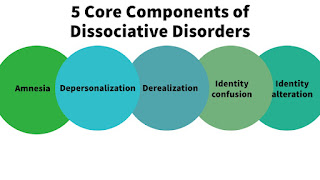Hey there, health enthusiasts! 🌱✨ In the hustle and bustle of our daily lives, it’s easy to overlook the importance of maintaining a healthy lifestyle. But fear not, because today, we’re bringing you a gentle reminder to prioritize your well-being with a few simple yet effective habits. 🍏 **Nourish Your Body: ** Remember, your body is a temple! Fuel it with a balanced diet rich in fruits, vegetables, lean proteins, and whole grains. Your plate should be a vibrant spectrum of colors, reflecting the diverse nutrients your body needs. 🏋️♂️ **Move That Body: ** Physical activity is not just about hitting the gym; it’s about finding joy in movement. Whether it’s a brisk walk, a dance class, or a yoga session, make time to get your body moving. Regular exercise not only boosts your physical health but also enhances your mood and reduces stress. 😴 **Prioritize Sleep: ** In our fast-paced world, sleep often takes a backseat. However, it’s crucial for overall well-being. Aim fo...
Dissociative disorders
Introduction
The human mind is a fascinating and intricate entity, capable of processing vast amounts of information, emotions, and experiences.
However, for some individuals, this intricate web can become disrupted, leading to a condition known as a dissociative disorder.
Dissociative disorders are a group of mental health conditions characterized by disconnection or detachment from one's thoughts, memories, feelings, or even their sense of identity.
In this article, we will explore the various types of dissociative disorders, their symptoms, potential causes, and available treatments.
Types of Dissociative Disorders
- Dissociative Identity Disorder (DID)
Formerly known as multiple personality disorder, DID is perhaps the most well-known type of dissociative disorder.
Individuals with DID experience the presence of two or more distinct identities or personality states, often accompanied by gaps in memory regarding personal information or significant events. These identities may manifest differently, leading to disruptions in daily life.
- Dissociative Amnesia:
This type of dissociative disorder involves the inability to recall important personal information, usually related to a traumatic event or period.
Memory loss is not due to normal forgetfulness, and it is often localised to specific aspects of the person's life. The memories may return spontaneously, or they may require therapy or other interventions.
- De personalization /Derealization Disorder
People with de personalisation disorder experience a sense of detachment from their bodies, thoughts, emotions, or actions.
They may feel as if they are observing themselves from outside their own body or as if they are living in a dream-like state.
Derealization disorder, on the other hand, involves a sense of detachment from the external world, making everything appear unreal or distorted.
Causes and Risk Factors
The precise causes of dissociative disorders are still being researched, but several factors may contribute to their development:
- Childhood Trauma
Many individuals diagnosed with dissociative disorders have a history of severe childhood trauma, such as physical, emotional, or sexual abuse.
Traumatic experiences overwhelming the individual's ability to cope may trigger dissociation as a defence mechanism.
- Coping Mechanisms
Dissociation may develop as a coping mechanism to deal with overwhelming stress, anxiety, or traumatic events.
It allows individuals to distance themselves mentally from distressing experiences or emotions.
- Brain Chemistry and Genetics
Certain studies suggest that abnormalities in brain chemistry and genetic factors may play a role in the development of dissociative disorders, although more research is needed to establish a definitive link.
Treatment and Support:
The treatment of dissociative disorders generally involves a comprehensive approach that addresses both the underlying trauma and the symptoms. Some common treatment modalities include:
- Psychotherapy
Different forms of therapy, such as cognitive-behavioural therapy (CBT) and dialectical behaviour therapy (DBT), are often used to help individuals understand their condition, explore traumatic memories, develop coping strategies, and integrate fragmented identities.
- Medication
While there are no specific medications for dissociative disorders, certain medications such as antidepressants or anti-anxiety drugs may be prescribed to manage associated symptoms, such as depression, anxiety, or sleep disturbances.
- Supportive Interventions
Support groups and peer support can provide individuals with dissociative disorders a safe space to share their experiences, gain validation, and learn from others who have gone through similar struggles.
Conclusion
Dissociative disorders are complex mental health conditions that can significantly impact an individual's sense of self, relationships, and overall well-being.
Understanding and recognising the symptoms of dissociative disorders is crucial for early intervention and appropriate treatment.





Comments
Post a Comment